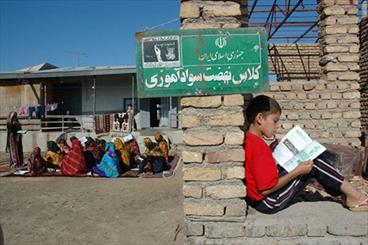ID :
352803
Mon, 12/29/2014 - 10:00
Auther :
Shortlink :
https://oananews.org//node/352803
The shortlink copeid
Literacy should be public demand for success: Cleric

QOM, Dec. 29 (MNA) – The deputy-head for Public Literacy of Qom Provincial Education Office said literacy should be a public demand.
Hojjatoleslam Mohammad Reza Qaseminia who was speaking in a press conference in Qom’s Literacy Movement local office on Sunday, pointed to remarks in 1980 by Imam Khomeini (RA) about the public literacy, believing that literacy was as important as health, housing, and other necessities of society; “eleven months after the Islamic Revolution of 1979, Imam Khomeini (RA) issued a directive ordering establishment of Public Literacy Movement, widely believed as the most important contributing factor to public literacy and mobilization,” he added.
Qaseminia also said that literacy should be a public demand, since literacy provides the basis for culture of the country; “there is 250 million children worldwide who cannot read even a single sentence; there are also 781 million adult illiterates around the world,” he detailed. “The general census of households in 2011 and self-reports among children of 6 and older indicated that 9.7 million are illiterate, with Qom province this figure being only 130,000,” Qaseminia said.
“The priority for the Literacy Movement is age group of 10-49; the same general census found that the illiterates in the age group was 3.4 million people; in the age group, Qom province performed better, with 2 per cent growth of literacy,” the official added.
“The minimum of literacy is literacy acquired in Literacy Movement classes, which teaches illiterate people the simple mathematical operations and helps them read simple Persian texts; a special plan underway involves teaching literacy to the illiterate parents of the students,” he asserted, believing that the project needed cooperation, resolution, and serious attempts by school principals, teachers, students and their parents.
“Another plan is to survey and find children and adolescents with physical disabilities, orphans, single-parent children, and street-workers and to help them acquire literacy,” Qaseminia told reporters. “Still another plan focuses on foreign nationals residing in Qom; the plan teaches them literacy without charging them for literacy classes; if necessary resources and budgets are provided, a 2-year plan would suffice to bring the illiterate foreign nationals into the light of literacy,” he added.
“Among the factors contributing to slow pace of literacy are reluctance in part of the illiterate public, lower resources in far-flung villages of the country, the lack of cooperation by children’s parents, the influx of migrants from rural regions of the province, and the lack of mandatory mechanisms to force children to attend the classes,” Qaseminia asserted.





